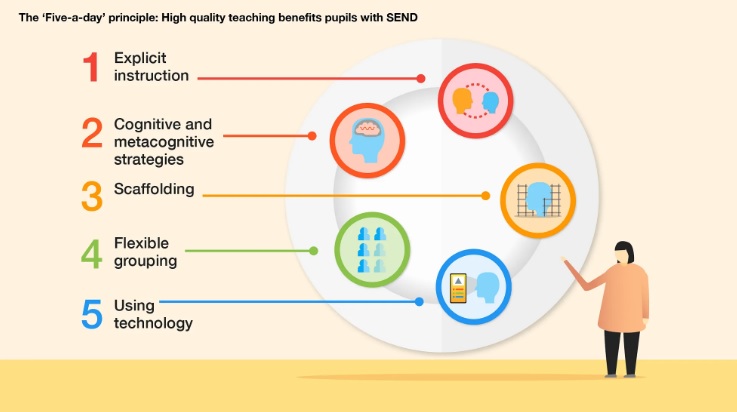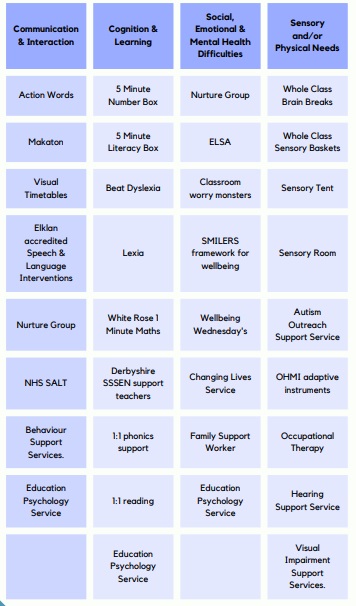SEND
Special Educational Needs and Disabilities (SEND)
SENDCO: Mr Mark Knight
SEND Link Governor: Mr Lee Reed
At Longstone School we are committed to providing high quality education for all learners so that they:
- are nurtured to become confident learners
- a passion is ignited inside them to achieve their best
- leave our school as successful and well-rounded young people who shine lights into the wider world.
We teach SEND children in our mainstream setting. All of our pupils are entitled to the same High Quality Teaching and have equality of access to the curriculum.
As a school we support the Local Offer made by Derbyshire Authority in relation to their commitment to delivery the Children and Families Bill 2014. More information on this can be found at www.derbyshiresendlocaloffer.org.
Please read our SEND Information Report below for further information.


Who are the best people to talk to in this school about child’s difficulties with learning/Special Educational Needs or Disability (SEND)?
Your Child's Class Teacher
The class teacher is responsible for monitoring the progress of your child and identifying, planning and delivering learning in an adaptive manner. They are responsible for writing pupil progress targets and support plans and sharing and reviewing these with parents. Class teachers are responsible for ensuring that the school’s SEND Policy is followed in their classroom.
The SENDCo
Mr Mark Knight is our school SENDCo. The SENDCo is responsible for developing and reviewing the school’s SEND policy as well as co-ordinating all support for children with special educational needs or disabilities (SEND). The SENDCo's role is to ensuring that parents/ carers and children where necessary are: i) involved in supporting your child’s learning ii) kept informed about the support your child is getting iii) involved in reviewing how they are doing. The SENDCo will Liaise with all outside agencies who may come to school to help support your child’s learning, e.g. Speech and Language Therapy, Educational Psychology. The SENDCo is responsible for updating the school’s SEND register (a system for ensuring that all the SEND needs of pupils in this school are known) and making sure that records of your child’s progress and needs are kept. They ensure the provision of specialist support for teachers and support staff in the school, so that they can assist children with SEND in the school to achieve the best progress possible.
The Head Teacher: Mr M Knight.
The Headteacher is responsible for The day-to-day management of all aspects of the school; this includes the support for children with SEND. The Head teacher will give responsibility to the SENCo and class teachers, but maintains overall responsibility for ensuring that your child’s needs are met. The Head teacher ensures that the Governing Body is kept up to date about issues relating to SEND
How does the school ensure that children/young people who need extra help are identified early?
Our teachers deliver high quality adaptive teaching and use diagnostic assessment to establish children's strengths and weaknesses on a day to day basis. We use a range of tools to gather assessment information. If we feel that your child is not making the progress we would expect over a sustained length of time, we will arrange to speak with you. We will typically discuss any concerns you may already have at home and plan additional support which we feel would benefit your child. This additional support forms a support plan and takes the form of a 4 part cycle: Assess, Plan, Do, Review.
A graduated approach to support recognises that children learn in different ways and have many types and levels of SEND. So increasingly, step by step, our approach will ‘grow’ as we introduce new methods or specialist expertise. Help may be only needed for a short time, for many years or for the whole of their education.
How will the school let me know if they have any concerns about my child’s learning in school?
If your child is identified as not making progress, the school will arrange a meeting with parents/ carers to discuss concerns in more detail and to:
- Listen to any concerns you may have.
- Plan any additional support your child may need.
- Discuss with you any referrals to outside professionals to support your child.
What are the different types of support available for children with SEND in our school?
High Quality Teaching
Our teachers have the highest possible expectations for your child and all pupils in their class. All teaching is built on what your child already knows, can do and can understand.Based on EEF research, our teachers deploy a repertoire of adaptive teaching strategies that can be used flexibly in response to the needs of all pupils. These are: i} flexible grouping; ii) cognitive and metacognitive strategies; iii) explicit instruction; iiii)using technology to support pupils with SEND; and v) scaffolding.
Carefully Selected Interventions
Specific group work Intervention which may be suitable to help your child make progress. This may take place in or out of the classroom. Interventions are delivered by trained staff, this could be either a teacher or a teaching assistant (TA). Our TAs are carefully deployed into their areas of specific expertise in order to achieve the best possible outcomes for each child.
Outside Agencies
Sometimes it is necessary for specialist outside agencies to deliver support to enable your child to make progress. This may be from Local Authority central services, such as the Autism Outreach Team, Behaviour Support Team or the Education Psychology Service (EPS). You may be asked to give your permission for the school to refer your child to a specialist professional, e.g. a Speech and Language Therapist or Educational Psychologist. This will help the school and your to understand your child’s particular needs better and be able to support them more effectively in school. The specialist professional will work with your child to understand their needs and make recommendations as to the ways your child is given support.
Specified Individual Support
This type of support is available for children whose learning needs are severe, complex and lifelong. This is usually provided via an Education, Health and Care Plan (EHCP). This means your child will have been identified by professionals as needing a particularly high level of specialist support. This type of support is available for children with specific barriers to learning that cannot be overcome through High Quality and Adaptive Teaching and intervention groups (See the Derbyshire Graduated Response). In these circumstances, your child will also need specialist support from outside agenices. This may be from Local Authority central services such as the Autism Outreach Team, Behaviour Support or outside agencies such as the Speech and Language Therapy (SALT) Service. For your child this would mean that the school (or you) can request that Local Authority Services carry out a statutory assessment of your child’s needs. This is a legal process which assists in scaffolding the specialist and highly targeted support provided for your child. EHCP requests follow a strict format and are submitted to a panel of professionals at the Local Authority where they will decide whether they think your child’s needs (as described in the paperwork provided), are complex enough to need a statutory assessment. If this is the case, they will write an Education Health Care Plan (EHCP). If this is not the case, they will ask the school to continue with the current level of support. The EHC Plan will outline the support your child will receive from the Local Authority and how the support should be used, and what strategies must be put in place. It will also contain long and short-term goals for your child. An additional adult may be used to support your child with whole class learning, run individual programmes or run small groups including your child if this is able to be facilitated by the personal budget allowance listed in the EHCP documentation.
How will the teaching be adapted for my child with SEND?
Class teachers plan and deliver lessons according to the specific needs of all groups of children in their class and will ensure that your child’s needs are met. Our staff use the EEF 5 a day approach to ensure our pupils with SEND make progress in their learning.

Support staff, under the direction of the class teacher, will adapt planning to support the needs of your child where necessary. Specific resources and strategies will be used to support your child individually and in groups. Planning and teaching will be adapted, on a daily basis if needed, to meet your child’s learning needs.
What intervention or support is provided for children with SEND in our school?

How are the Staff in school trained to work with children with SEND and what training does the Staff have?
At Longstone we provide our staff with the appropriate training and support to enable all staff to improve the teaching and learning of children, including those with SEN. This includes whole school training on SEN issues, such as Autism Spectrum Disorder (ASD) and speech and language difficulties. Individual teachers and support staff attend training courses run by outside agencies that are relevant to the needs of specific children in their class, e.g. from the Autism Outreach Team (AoT) service. Training and support is also provided by the SSSEN support service in areas such as developing reading, developing writing physical literacy, social emotional needs and sensory/physical needs.
Currently, our staff are accredited to deliver the following support:
- ELSA - emotional literacy
- Makaton
- Action Words
- RWI phonics
- 5 Minute Number Box
- 5 Minute Literacy Box
- Beat Dyslexia
- Emotion Coaching
- Nurture
- Elklan Speech & Language Support
- Confident Communicators
- Sensory Processing Support (Autism Outreach)
- Lego Therapy
- See & Learn whole word reading
- Autism Advocacy
We are always looking to expand the expertise of our team and our staff are trained in new imitatives and interventions as and when new situations arise.
How will the teaching be adapted for my child with SEND?
Our Teachers have developed a repertoire of strategies that they can use flexibly in response to the needs of SEND pupils. These include:
- Flexible grouping; pairing and grouping children for specific tasks according to their needs. Children may move around their class and school to work with the peers with whom they will make the most progress.
- Cognitive and metacognitive strategies; Our teachers explicitly teach pupils metacognitive strategies, including how to plan, monitor, and evaluate their learning. They do this by modelling their own thinking to help pupils develop their metacognitive and cognitive skills. Teachers use KWL sheets as graphic organisers and vocabulary lists for children to utilise independently to support cognitive strategies for their learning.
- Explicit instruction; Our teachers assign learning in small steps using visual examples. We plan for common misconceptions and use clear language to explain processes and expectations to the children. We remove distracting backgrounds and text from work tasks to enable children to focus on their explicit small step learning.
- Using technology to support pupils with SEND; Technology is woven into our curriculum. Children with send use apps that provide instruction to remind them of their small step tasks as well as using apps to practice opportunities for a wide range of skills; e.g. Lexia, TTRS, AR, 1 Minute Maths, Numbots, Spelling Shed, Writing repeater. SEND children also have access to noninstructional apps that act as an aid to learning, such as notetaking apps; word processors and speech-generating apps to augment the communication skills of pupils with communication difficulties.
- Scaffolding; ‘Scaffolding’ is a metaphor for temporary support that is removed when it is no longer required. Initially, our teachers will provide enough support so that pupils can successfully complete tasks that they could not do independently. Support could be visual, verbal, or written. The teacher will gradually remove the support (the scaffold) as the pupil becomes able to complete the task independently.
How is progress measured for children with SEND?
Your child’s progress will be continually monitored by his/her class teacher. Their progress will be reviewed formally with the Headteacher and SENDCo every term in reading, writing and Maths. At the end of each key stage (i.e. at the end of year 2 and year 6), all children are required to be formally assessed using Standard Assessment Tests (SATS). This is something the government requires all schools to do and are the results that are published nationally.
Where necessary, children will have a Support Plan based on targets set by outside agencies specific to their needs. Targets will be set and designed to accelerate learning and close the gap. Progress against these targets will be reviewed regularly, evidence for judgements assessed and a future plan made.
The progress of children with a GRIP/EHC Plan will be formally reviewed at an Annual Review with all adults involved with the child’s education. The SENDCo will also check that your child is making good progress within any individual work and in any group that they take part in.
Regular monitoring is carried out by the SENDCo and other members of the Senior Management Team to ensure that the needs of all children are met and that the quality of teaching and learning is high.
AWhat support do we have as a parent/carer of a child with SEND?
The class teacher is regularly available to discuss your child’s progress or any concerns you may have and to share information about what is working well at home and school, so that consistent and effective strategies can be used.
The SENDCo is available to meet with you to discuss your child’s progress or any concerns/worries you may have. When outside agencies and external professionals are consulted, all information will be discussed with you directly, or where this is not possible, in a report.
Support Plan targets will be reviewed with your involvement and homework will be adjusted as needed to your child’s individual requirements. Each child in school has a planner which is used as a home-school contact book to support communication with you when this has been agreed to be useful for you and your child.
How is our school accessible to pupils with SEND?
Our school is accessible to wheelchair users. The school is single story and access is provided via ramps at each classroom door. We have a large designated disabled toilet space to accommodate wheelchairs and additional equipment as required. Where possible, additional resources will be purchased to support the needs of each individual with SEND. The school is secure and has restricted access.
How will we support your child joining this school? Leaving this school? Moving to another class?
We recognise that transitions can be difficult for a child with SEND, and we take steps to ensure that any transition is a smooth as possible.
If your child is joining us from another school
For children entering school in their reception year, the SENDCo will visit pre-schools when appropriate. A visual starting school booklet and social story is provided to assist your child in becoming familiar with the setting. Children are encouraged to visit our school and stay for a taster session to enable them to become familiar with adults and the school building.
If your child is moving to another school
We will contact the school SENDCo and ensure they are aware of any special arrangements or support that needs to be made for your child. We will make sure that all records about your child are passed on as soon as possible. If your child would be helped by a visual aid or social story to support them in understand moving on, then one will be made for them.
When moving classes in school:
Information will be passed on to the new class teacher in advance and ia planning meeting will take place with the new teacher. Support Plans will be shared with the new teacher.
In Year 6:
The SENDCo will discuss the specific needs of your child with the SENDCo of the child’s allocated secondary school. Your child will participate in focused learning relating to aspects of transition, to support their understanding of the changes ahead. Where possible, your child will visit their new school on several occasions, and in some cases staff from the new school will visit your child in this school.
How will we support your child joining this school? Leaving this school? Moving to another class?
. We recognise that some children have extra emotional and social needs that need to be developed and nurtured. These needs can manifest themselves in a number of ways, including behavioural difficulties, anxiousness, and being uncommunicative. All classes follow a structured PSHE (Derbyshire PSHE Matters) curriculum to support this development. However, for those children who find aspects of this difficult we offer:
- An in-school nurture provision, run by Mrs Mitchell. This follows the Nurture Principles and is run on a termly basis.
- 1-1 and small group ELSA sessions Lunchtime and playtime support through planned activities and groups.
- If your child still needs extra support, with your permission the SENDCo will support further
